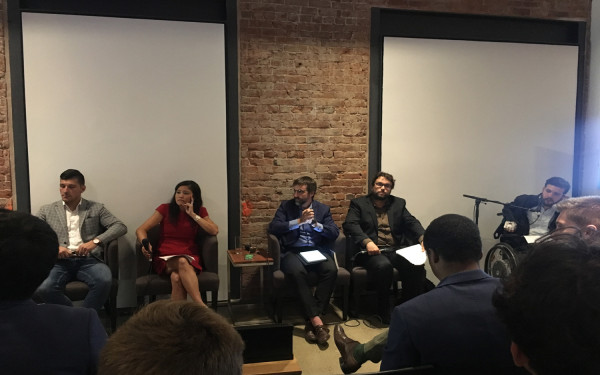A Bottle Panel
Experts from the Industry Weigh In on Water Bottles
Water privatization was the topic on the table at a panel on Nov. 24, as insiders from the beverage industry, academics and environmental researchers were invited to debate both sides of banning water bottles on campus.
Drinking tap water from reusable, Concordia Student Union-issued mugs, panellists discussed Concordia’s decision to extend the exclusive beverage contract with PepsiCo., the power of consumer choice and public water infrastructure—a debate that was the first of its kind at a Canadian university.
“None of the seven universities who banned water bottle sales on campus brought people from the industry to discuss the issues,” said John Challinor, director of Corporate Affairs for Nestlé Waters Canada. “My concern [with banning the sale of water bottles on campus] is we’re going down a path of environmental symbolism that will not be meaningful for environmental change.”
Justin Sherman, president of Refreshments Canada, agreed with Challinor, putting the onus on consumer demand as the reason to keep the water bottles in vending machines.
“There are a number of elements this issue [of water privatization] revolves around, such as the right and access to water, […] but another element is choice: it is 100 per cent you’re right not to buy it,” he said. “It’s a product of convenience.”
On the other side of the debate was Tony Clarke, founder of the Polaris Institute, an anti-globalization Canadian think-tank based in Ottawa, and Joanna Eyquem, a freshwater scientist and Concordia lecturer who specializes in geomorphology and landform processes.
“In terms of the symbolism,” said Ancham, “it is a statement if you have something available on tap that you’re already paying for in taxes, and then you put it into a plastic package. We need to be thinking about this act, this choice […] to be more sustainable, but to also think about how we use this important resource. We just don’t need to package it.”Clarke also criticized private industry capitalizing on water, since it was recently declared a fundamental human right by the United Nations.
“We can all agree when we say that access to water is the essence of life, so do we allow the distribution of a life source to be determined by market forces?” asked Clarke. “What we’re doing, if we choose this path, is saying that those who have access live, and those who do not will not. Globally speaking, this is a critical problem. It extends far beyond exclusivity on campus.”
But more locally, he argued, exclusivity contracts like Concordia’s agreement with PepsiCo. actually circumvents customer choice.
“When we’re talking about a university contracting one company exclusively, only one brand of product alone is sold. There’s really not much choice there,” he argued. “And what happens to choice when water fountains are pushed aside, are in disrepair, or are taken out of commission? This is happening [on] more campuses than not as a result of these contracts.”
The bottled beverage side of the debate argued that the university’s investment in water fountain infrastructure on campus has nothing to do with the contracts.
“Quite frankly, it’s their decision to invest in it at the end of the day,” said Challinor. “It’s illogical to suggest money spent on bottled water is not being spent on water infrastructure.”
He added that it is actually the water bottle industries leading the way in contemporary water science.
“At one time, this was done by government, but over the last 25 years, this has changed. The government has not had the resources to allow for this to be done […] so you see industry taking the lead,” he said. “We spend $3 billion a year on hydrogeology studies to support the renewal of water systems—it’s a science that is necessary to map our water sheds across the country.”
But a two-tiered system to manage and regulate water resources sets a dangerous precedent, argued Clarke.
“Yes there is a huge infrastructure debt that will stare us in the face over the next 15 years in regards to water services,” he said. “But the question is how we’re going to rebuild public infrastructure and how are those companies—who make quite a substantial profit from this resource—going to contribute to that?”
The panel discussion was recorded by Concordia University Television and should be up on their website at the end of the week.
This article originally appeared in Volume 31, Issue 16, published November 30, 2010.

__900_600_90.jpg)




